July 31, 2023
Breaking the Stigma: Why Everyone Should Consider Seeing a Therapist
Written by Guest Author
Posted in Emotional & Mental Health and with tags: mental health, therapist

Many people believe that seeking therapy is a sign of weakness or that only those with mental illness need therapy. However, this is far from the truth.
Therapy is for anyone who wants to improve their mental health and overall wellbeing.
In this blog post:
- Part 1 will discuss the importance of breaking the stigma surrounding therapy and why everyone should consider seeing a therapist.
- Part 2 will highlight five signs that suggest it may be time to see a counselor.
Part 1: The Stigma Surrounding Therapy
There is a stigma surrounding therapy that suggests that only those with severe mental illness need therapy.
This stigma has created a fear in many people that seeking therapy will result in a negative label being placed on them.
This fear has prevented many people from seeking the help they need to improve their mental health.
It is important to remember that therapy is not just for those with severe mental illness.
Therapy is for anyone who wants to improve their mental health and overall wellbeing.
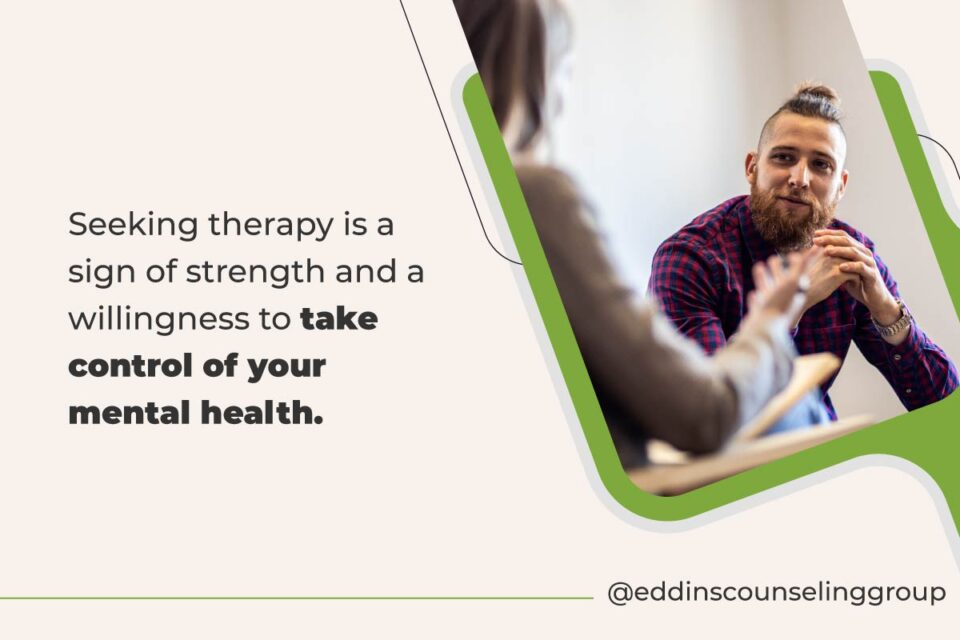
The Importance of Mental Health
Mental health is just as important as physical health.
Mental health affects how we think, feel, and act. It affects our relationships, our work, and our overall quality of life.
Taking care of our mental health is essential to living a happy and fulfilling life.
Ignoring our mental health can lead to negative consequences such as:
- Stress,
- Anxiety,
- Depression, and even
- Physical illness.
Seeking therapy can help improve our mental health and overall wellbeing.
4 Benefits of Seeing a Therapist
Improved self-esteem and self-awareness
Therapy can help improve our self-esteem and self-awareness by helping us understand ourselves better. A Houston therapist can help us identify and challenge negative thoughts and beliefs that are holding us back.
Enhanced communication skills
Therapy can also help improve our communication skills. A therapist can help us learn how to express our thoughts and feelings more effectively. This can improve our relationships with others and our overall quality of life.
Better coping mechanisms
Therapy can also teach us better coping mechanisms for dealing with stress and difficult situations. A therapist can help us identify healthy ways to cope with stress and improve our resilience.
Reduced stress and anxiety
Therapy can help reduce stress and anxiety by providing a safe space to talk about our problems. A therapist can teach us stress management techniques and help us develop strategies for dealing with anxiety.
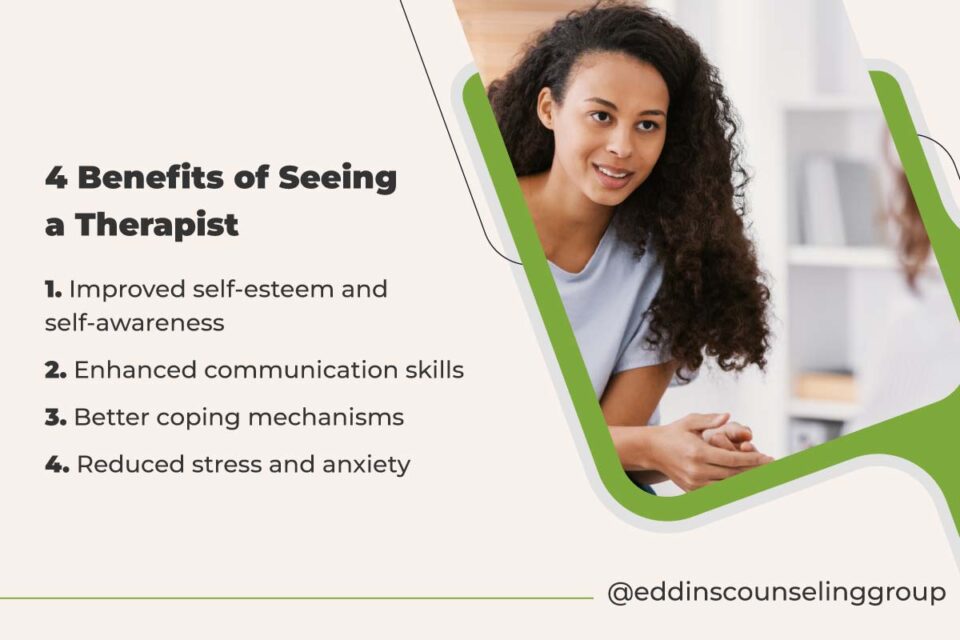
Types of Therapy
Cognitive Behavioral Therapy
Cognitive Behavioral Therapy (CBT) is a type of therapy that focuses on changing negative thought patterns and behaviors. CBT has been shown to be effective in treating depression, anxiety, and other mental illnesses.
Psychodynamic Therapy
Psychodynamic Therapy is a type of therapy that focuses on the unconscious mind and how it affects our thoughts, feelings, and behavior. Psychodynamic Therapy can help us understand the root causes of our problems and develop strategies for dealing with them.
Family Therapy
Family Therapy is a type of therapy that involves the entire family. Family Therapy can help improve communication and relationships within the family and can be effective in treating a variety of mental health issues.
Group Therapy
Group Therapy is a type of therapy that involves a group of people who are all experiencing similar problems. Group Therapy can provide a supportive environment where individuals can share their experiences and learn from each other.
How to Find a Therapist
Referrals from friends and family
One of the best ways to find a therapist is to ask for referrals from friends and family. They may have had a positive experience with a therapist and can recommend someone who may be a good fit for you.
Search engines
Search engines such as Google can be a helpful tool for finding a therapist website. You can search for therapists in your area and read reviews from other patients.
Therapist directories
Therapist directories such as Psychology Today can help you find a therapist in your area. These directories typically provide information on a therapist’s areas of expertise, fees, and contact information.
Psychology Today
Psychology Today is a website that provides a directory of therapists and mental health professionals. The website allows you to search for therapists based on location, specialty, and insurance coverage.
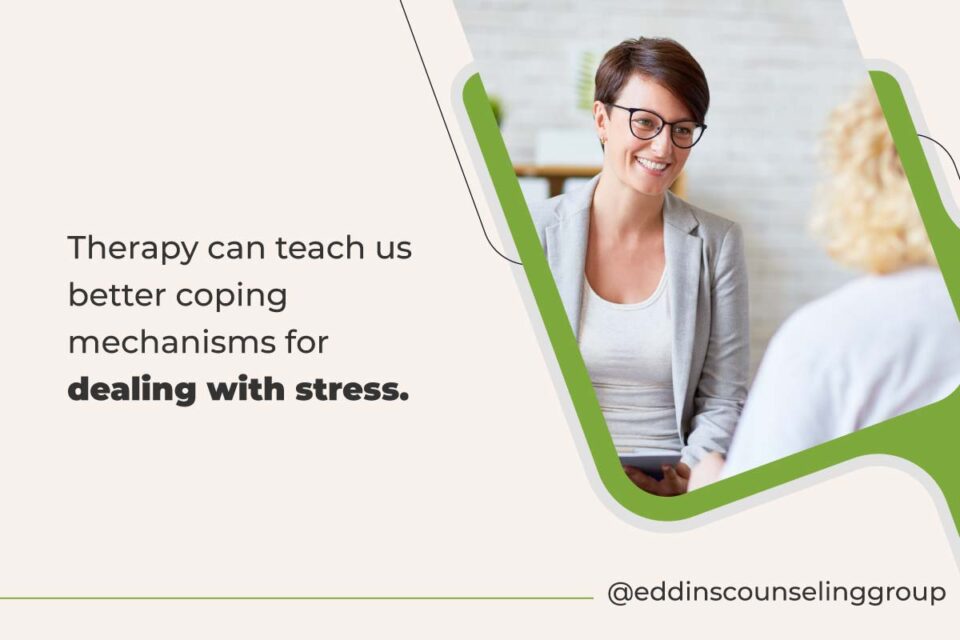
What to Expect in a Therapy Session
Intake process
The first session with a therapist typically involves an intake process. This process may involve filling out paperwork and discussing your medical history and current symptoms.
Confidentiality
Therapists are required to maintain confidentiality with their patients. This means that anything you discuss with your therapist will remain confidential unless there is a risk of harm to yourself or others.
Goal setting
During your first few sessions, you and your therapist will work together to set goals for your therapy. These goals will be based on your individual needs and may be adjusted as you progress through therapy.
Frequency and duration of sessions
The frequency and duration of therapy sessions will vary depending on your individual needs and goals. Some people may benefit from weekly sessions, while others may only need monthly sessions.
Part 1 Recap – Breaking the Stigma: Why Everyone Should Consider Seeing a Therapist
Breaking the stigma surrounding therapy
It is important to break the stigma surrounding therapy and to recognize that seeking help is a sign of strength. Therapy is for anyone who wants to improve their mental health and overall wellbeing.
Encouragement to seek help
If you are struggling with your mental health, it is important to seek help. There are many resources available, including therapy, that can help you improve your mental health and overall wellbeing.
Importance of prioritizing mental health
Just as we prioritize our physical health, it is important to prioritize our mental health.
Taking care of our mental health is essential to living a happy and fulfilling life.
Remember, seeking therapy from one of our Houston therapists, Montrose therapists, or Sugar Land therapists is a sign of strength and a willingness to take control of your mental health.
Don’t let the stigma surrounding therapy prevent you from seeking the help you need.

Part 2: 5 Signs It’s Time to See a Counselor
Our mental health is just as important as our physical health. However, many people don’t prioritize their mental health needs or seek professional help when they’re struggling.
Seeking counseling can be intimidating, but it’s important to know when it’s appropriate to seek the support of a professional.
In Part 2, we’ll highlight five signs that suggest it may be time to see a counselor.
Defining Counseling
Counseling is a form of therapy that involves talking to a trained professional about your thoughts, feelings, and behaviors.
The goal of counseling is to help you understand and cope with difficult emotions or situations.
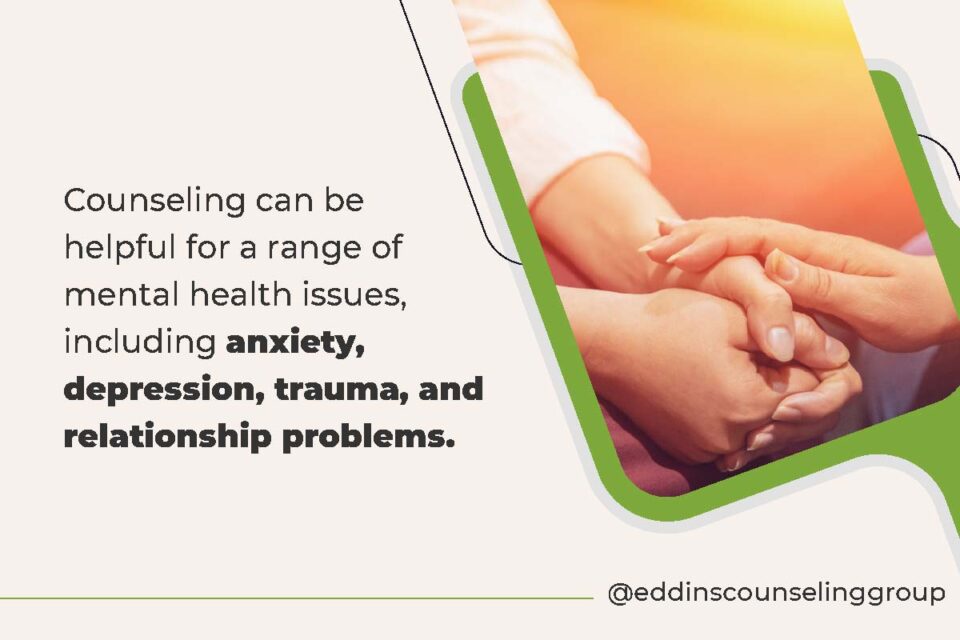
Why It’s Important to Seek Counseling
Seeking counseling can help you develop coping skills and strategies to manage difficult emotions or situations.
Counseling can also help you identify patterns in your thoughts or behaviors that may be holding you back.
Additionally, counseling can improve communication skills and enhance relationships.
Sign #1: Feeling Overwhelmed
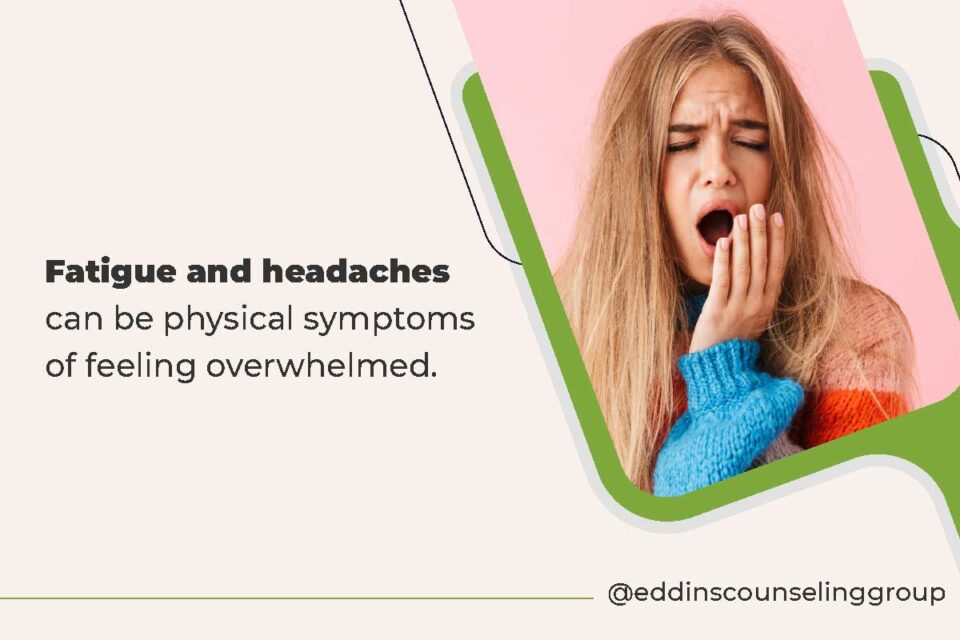
If you’re feeling overwhelmed, it’s important to pay attention to both the physical and emotional symptoms.
Physical symptoms of overwhelm can include:
- fatigue,
- headaches, and
- muscle tension.
Emotional symptoms of overwhelm can include:
- irritability,
- restlessness, and
- difficulty concentrating.
If you’re experiencing these symptoms, it may be time to seek counseling.
A counselor can help you identify triggers for overwhelm and develop coping skills to manage stress and anxiety.
Sign #2: Unresolved Trauma
Trauma can have a significant impact on mental health.
Types of trauma can include:
- physical abuse,
- sexual assault, and
- emotional abuse.
If you’ve experienced trauma and haven’t received treatment, it may be time to seek counseling.
Counseling can help you process trauma and develop coping skills to manage symptoms of post-traumatic stress disorder (PTSD).
Treatment options for trauma can include:
- Talk (trauma) therapy,
- Trauma-focused cognitive behavioral therapy (TF-CBT),
- Eye movement desensitization and reprocessing (EMDR), and
- Brainspotting trauma therapy.
Sign #3: Difficulty Managing Emotions

Difficulty managing emotions can manifest in a variety of ways, including:
- anger outbursts,
- overreaction to minor issues, and
- feeling out of control.
If you’re experiencing these symptoms, it may be time to seek counseling.
A counselor can help you identify the underlying causes of emotional dysregulation and develop tools for managing difficult emotions.
Treatment options can include talk therapy, mindfulness practices, and cognitive behavioral therapy.
Sign #4: Relationship Issues

Relationship issues can be a significant source of stress and anxiety.
Types of relationship issues can include:
- communication difficulties,
- trust issues, and
- infidelity.
If you’re experiencing relationship issues, it may be time to seek counseling.
A counselor can help you identify patterns in your relationships and develop communication skills to enhance your relationships.
Additionally, counseling can help you process feelings of betrayal or hurt and develop strategies for rebuilding trust.
Sign #5: Chronic Stress or Anxiety
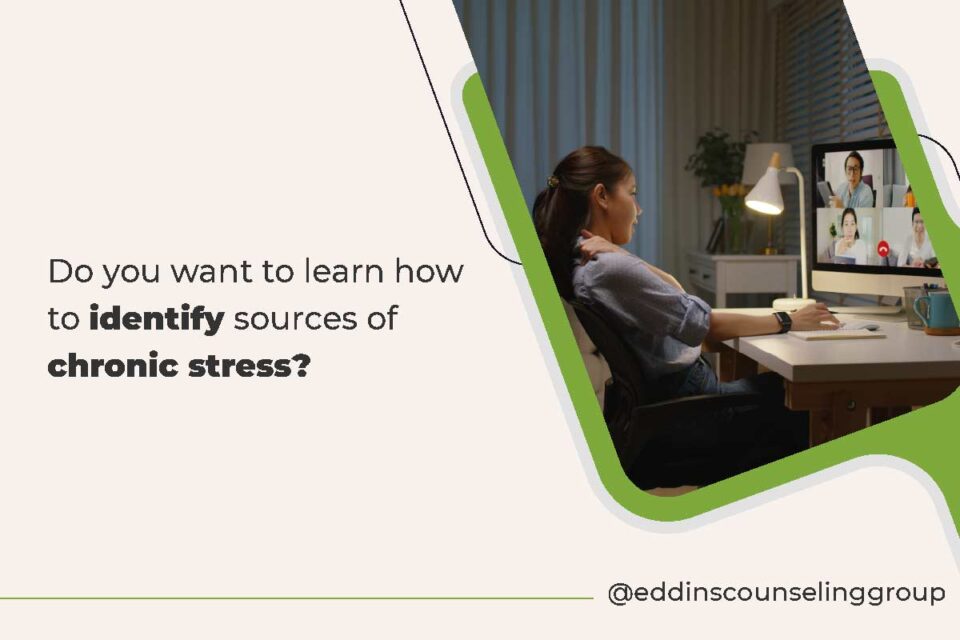
Chronic stress can have a significant impact on mental health.
Physical symptoms of chronic stress can include:
- headaches,
- digestive issues, and
- insomnia.
Mental health symptoms can include:
- anxiety,
- depression, and
- irritability.
If you’re experiencing these symptoms, it may be time to seek counseling.
A counselor can help you identify sources of chronic stress and develop coping skills to manage stress and anxiety.
Treatment options can include talk therapy, mindfulness practices, and cognitive behavioral therapy.
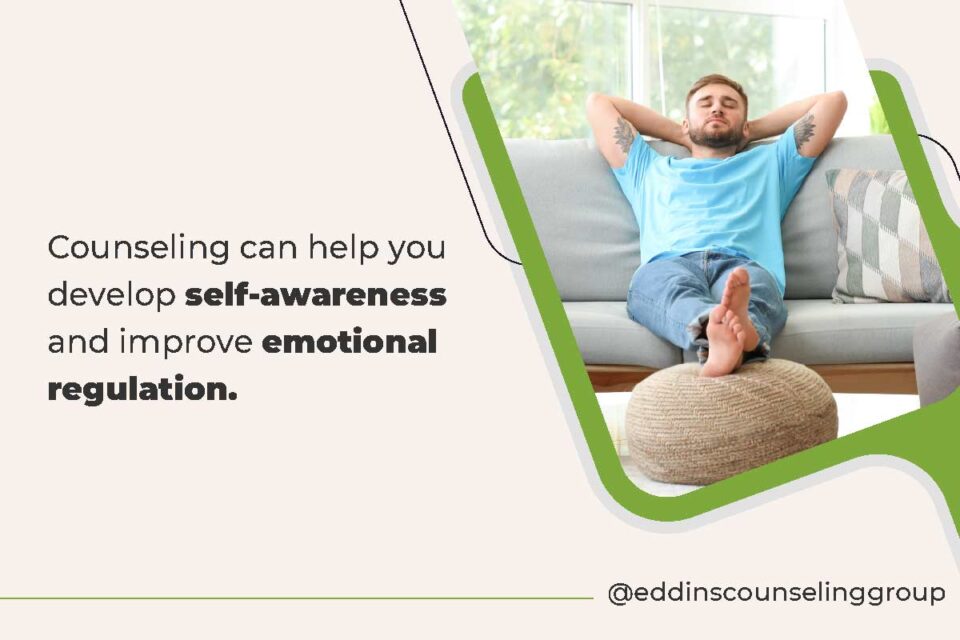
Finding a Counselor
Finding a counselor can be intimidating, but there are many resources available.
You can start by:
- asking for recommendations from friends or family members, or by
- searching for licensed therapists in your area online.
When looking for a counselor, it’s important to find someone who is a good fit for you.
This may involve trying out a few counselors before finding the right one.
Additionally, it’s important to make sure that the counselor is licensed and trained in the areas you’re seeking help with.

Benefits of Seeking Professional Support
Seeking professional support can have many benefits for mental health.
Counseling can improve:
- coping skills,
- enhance communication, and
- improve relationships.
Additionally, counseling can help you develop self-awareness and improve emotional regulation.
If you’re experiencing any of the signs outlined in this post, it may be time to seek counseling.
Remember, seeking help is a sign of strength, and there is no shame in prioritizing your mental health needs. Our Houston therapists, Montrose therapists, or Sugar Land therapists look forward to working with you!
Grounding & Self Soothing
Get instant access to your free ebook.
Why You Feel This Way
Get instant access to your free ebook.






















